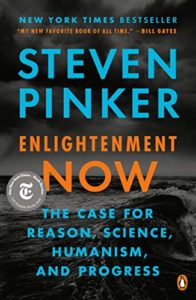Whether you get your news from the internet, television, newspaper, radio, or any other media outlet, it can be downright depressing. Headlines abound of natural disasters, terrorism, war, territorial disputes, violent crimes, and, these days, continuous coverage of the pandemic. It’s enough to make you think we live in the darkest of times.
This constant negative news cycle led me to read Factfulness by Hans Rosling last year. If you haven’t read it, I highly recommend it. It’s one of my Must Reads and at the top of my books to read in 2020. The book puts the news cycle into its proper perspective and makes you realize that we actually live in the best times ever known to humanity.
I’ve made this opinion known to many people, and in one of those discussions, a friend told me that I had to read Enlightment Now by Steven Pinker. Since I like to get input and insight from different sources on a subject, and since this was a very good friend and trusted source, I made it a point to put the book near the top of my reading list for this year.
Enlightenment Now is divided into three parts. In the first part, Pinker sets up his case. In the second part, he takes you on a journey through health, the environment, violence, inequality, and more to show, through statistics and facts, how the world is in the best shape that it has ever been. While doing so, he shows how science and reason, the products of the Age of Enlightenment, have propelled the world forward and continue to do so, in spite of efforts to thwart it by various factions over time. Finally, in the third part, he defends the progress made and makes the case that we need to continue on this path to advance humanity, ultimately making a case for humanism. Humanism stresses the potential value and goodness of human beings, emphasizes common human needs, and seeks rational ways to solve himan problems.
I found Enlightenment Now difficult to read. It was long, heavily opinionated in spots, and had arguments that were tough for me to follow. There’s also a strong political bias in the book which could put people off and harden them to the valuable messages contained within. While I disagree with some of his beliefs, political messages, and philosophies, I agree with the general theme. Unfortunately, others may not be willing to separate these and will dismiss his valid arguments as to why science, reason, and humanism are the pillars of human progress.
Factfulness and Enlightenment Now are very similar books. Both will emphasize and prove how far humanity has advanced, particularly in the last 200 years. Overall, I liked Factfulness a lot better. It was easier to read and stayed more objective throughout. Rosling takes a less biased approach and sticks to the facts and numbers. In other words, he keeps his focus on the numbers and takes a more strictly quantative approach as to why the world is better rather than mixing in qualitative arguments.
Either way, you need to read at least one of the these two books. It will allow you to see and appreciate the tremendous progress that has made the world a better place, in spite of what the media wants and leads you to believe.

